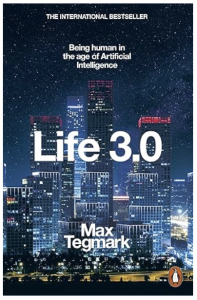I’m late to Max Tegmark’s Life 3.0. For all its bestseller status, it didn’t do a lot for me. Probably more to do with me than the book. There’s a large chunk about the distant future and existential risk, which I can’t get interested in. There’s also a lot of physics and evolution, philosophy and cognitive science thrown in to the mix, at a very simplified level. And then there’s the love-in with Elon Musk – including a back cover blurb by the billionaire recently referred to by the Daily Star as a ‘car salesman’. Musk funded Tegmark’s Future of Life Institute. Life 3.0 was published in 2017, pre-Musk’s Twitter takeover and voyage into questionable political stances. But fundamentally, I couldn’t figure out what the book is trying to say, beyond that AI is changing things a lot.
Having said all that, there were some points that interested me. One is the idea of the substrate-independence of computation. Another – one that jumps out from the examples of AI use cases and how they can go wrong, rather than being made explicitly in the book – is that communication between AIs and humans will be fundamentally important to avoiding terrible mistakes. The UX design here is surely as important as any prompt engineering. The third is a section about the reported argument (by David Vladek) that self-driving cars whould be required to have their own car insurance, which will incentivise safety in their design. This raises a question about whether AIs could own property, and when you think about it one could instead require the owners of self-driving cars to take out the insurance. But it’s an interesting throught.
I think Life 3.0 is worth a read nevertheless. (Yuval Noah Harari quite liked it – whatever you make of that.) It ranges widely over the kind of issues societies need to be thinking about as they let AIs operate, and is clearly-written – a good flight or train journey book.

